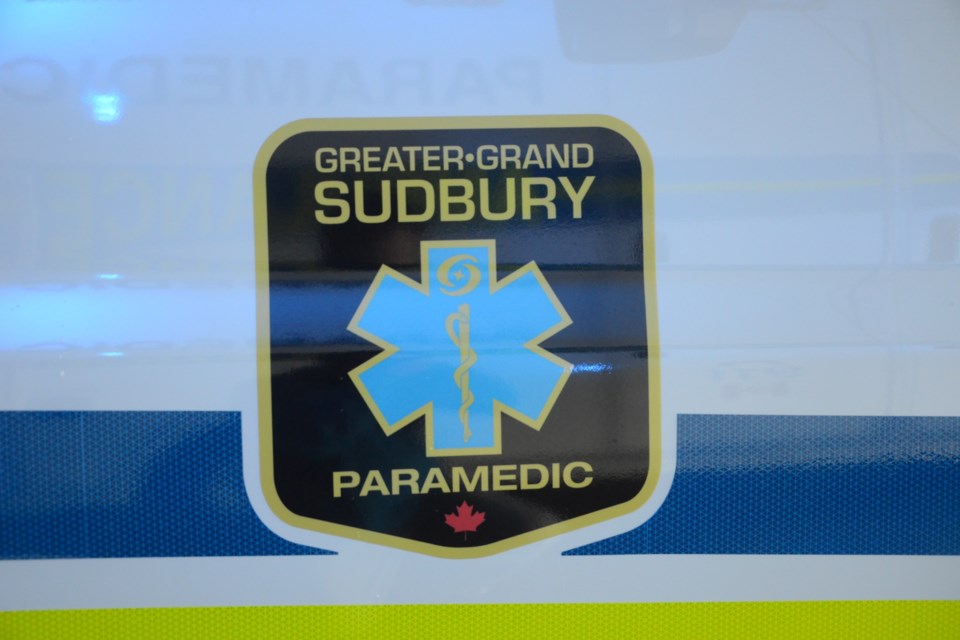Greater Sudbury paramedics are spending more time at Health Sciences North waiting for patients to offload.
Last year, they spent 5,560 hours at the hospital on ambulance offload delays, which is a 26-per-cent jump from the 4,411 hours reported in 2022.
An ambulance offload delay is a delay in transfer of patients between paramedics and emergency room nursing staff.
“This equates to 15 hours every single day of the year of lost time for emergency resources,” according to a report by city Paramedic Services deputy chief Paul Kadwell, which was tabled for the April 22 community and emergency services committee meeting of city council.
These delays deplete resources and affect their ability to respond to the scenes of emergency situations within target times.
To mitigate these impacts on local paramedics, the province has provided $550,000 in 2023/24 toward the Designated Offload Nurse Program. This program has nurses care for patients coming to the hospital by ambulance who would otherwise be part of ambulance offload delays.
This program has been in place since 2013, with current funding a boost from its previous annual funding of $216,907, which covered one designated offload nurse seven days a week from 10 a.m. to 10 p.m. The current staffing model consists of both an offload nurse and two paramedics, seven days per week, 24 hours per day.
Within their 2023 budget, city council approved adding two ambulance shifts to their frontline paramedic operations to help with response times. These additions were effective July 2023.
An upcoming addition is expected to take place this month, when a dedicated non-urgent ambulance will be added to Sudbury. The province affirmed one-time funding of $978,000 for 2024-26 to pay for the unit, which is intended to handle non-urgent patient transportation.
In 2023, non-urgent transportation accounted for 2,403 calls, or 7.4 per cent of Sudbury paramedic resources.
These additions will help improve response times, according to Kadwell’s latest report.
Sudbury paramedics have been dealing with ambulance offload delays since 2005, due to “a lack of in-patient bed capacity leading to high numbers of in-patients remaining in the emergency department,” according to a 2022 report by Kadwell.
Last year, there were 32,423 calls for service, which marked a three-per-cent decrease from 2022. The community paramedicine program, under which seniors receive home visits from a team of paramedics, is credited in Kadwell’s report with diverting 2,200 calls from 911.
Response times in 2023 largely echoed those reported for 2022.
The same as in 2022, response times for the highest-acuity calls failed to meet targets.
For sudden cardiac arrests, the target is arriving within six minutes 70 per cent of the time, while a rate of only 60 per cent was achieved locally last year (the same as in 2022).
Of last year’s 154 sudden cardiac arrests, paramedics arrived within six minutes 80 times, firefighters arrived within six minutes 10 times, and on three occurrences an automated external defibrillator was used three times within six minutes.
For Canadian Triage Acuity Scale (CTAS) 1 calls (critically ill or have potential for rapid deterioration), the goal is a response time of eight minutes or less 80 per cent of the time, and local paramedics achieved 74 per cent (worse than the 76 per cent reported in 2022).
For CTAS 2 calls (potential to life, limb, or function, requiring rapid medical intervention, controlled acts), the goal is a response time of 10 minutes or less 85 per cent of the time, and local paramedics achieved 82 per cent (the same as in 2022).
For lower-acuity rankings, CTAS 3-5, the goal is a response time of 15 minutes 85 per cent of the time, which local paramedics achieved for, ranging from 94-95 per cent.
Tyler Clarke covers city hall and political affairs for Sudbury.com.
